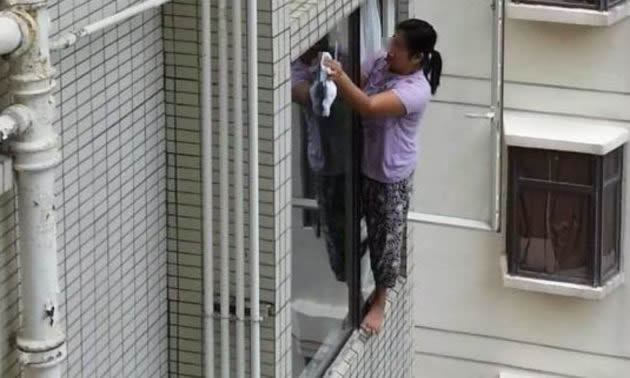|

Cleaning the outside of a window 4 stories up. Photo:
Facebook/Time News International/Asia
Times
 or
decades the Philippine economy has been kept afloat by millions of
overseas Filipino workers (OFWs) sending money back home. According to
philstar.com in an article published early this year, the World Bank
ranked the Philippines as the “3rd top remittance receiving country in
the world” after India (first), and China (second). or
decades the Philippine economy has been kept afloat by millions of
overseas Filipino workers (OFWs) sending money back home. According to
philstar.com in an article published early this year, the World Bank
ranked the Philippines as the “3rd top remittance receiving country in
the world” after India (first), and China (second).
Domestic helpers make up a significant percentage of younger, mostly
female, OFWs, working in major cities across the globe. The job can
sometimes be quite dangerous. Not all employers are as enlightened or
compassionate as people might expect them to be. In the photo above,
from an article in Asia Times, a woman is seen cleaning a window from
the outside of an apartment building in Hong Kong.
The
article notes that “over the past five years, there have been six cases
of foreign domestic workers falling to their deaths while cleaning
windows. In 2017, the [Hong Kong] Labor Department introduced rules aimed at
protecting domestic helpers from requests to clean the exterior of
windows in high-rise buildings.”
Hong
Kong authorities set new rules in place. “Two new clauses were added to
employment contracts. One clause states that only windows with locked
grilles can be cleaned by maids. The other stated that no part of the
domestic worker’s body should be outside the window except the arms.”
Placement agencies in Hong Kong speak highly of Filipina domestic
helpers. Their level of education and fluency in English allow them to
demand higher wages compared with domestic helpers from other countries.
Children cared for by Filipina nannies also tended to be more fluent in
English, studies showed.
So,
while Filipinos are grateful for the outstanding work domestic helpers
are doing, in addition to the significant amount of foreign reserves
they remit to the economy, we cannot afford to remain complacent.
The
government should vastly improve its primary and secondary education
systems and make them widely available across the nation. so that
tomorrow’s OFWs can have even better paying jobs open to them.
As we
mentioned in previous editorials, science and technology continues to
gain an ever-greater importance as we move deeper into the 21st century.
Tomorrow’s jobs will require a workforce steeped in the sciences, along
with the mental dexterity to understand and manipulate an
ever-increasing number of new technologies.
Filipino OFWs of tomorrow should not be limited to low-paying, low-skill
jobs. They should have their pick of high-paying, high-skill jobs as
well. We are a smart, creative, and hard-working people—but in the 21st
century, those qualities aren’t enough. You need a firm background in
science and technology to underpin those qualities.
We
said it before—we’ll say it again: top quality science-based education
is the answer. Let’s hope our leaders come to that same realization as
well. Published
10/17/2018 |